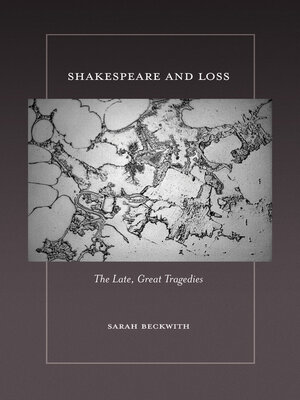
Sign up to save your library
With an OverDrive account, you can save your favorite libraries for at-a-glance information about availability. Find out more about OverDrive accounts.
Find this title in Libby, the library reading app by OverDrive.



Search for a digital library with this title
Title found at these libraries:
| Library Name | Distance |
|---|---|
| Loading... |
Shakespeare and Loss explores how, in Shakespeare's late tragedies (Hamlet, King Lear, Timon of Athens, Macbeth, Coriolanus, and Antony and Cleopatra), some of the most fundamental forms of understanding and life that bind human communities together—grieving; loving; giving; acting and doing; speaking and being human; marrying, conversing, and judging—can become dangerously, even lethally obscure. These losses, Sarah Beckwith contends, shape the form, plot, and preoccupations that the late tragedies take and define them as a group, which she terms "tragedies of exile."
This unprecedented and searing run of tragedies written between 1601 and 1608 features protagonists who are driven out (or drive themselves out) of family and society, finding themselves banished (or seeking exile) to the edgelands of civilization. Using philosophical insights from Ludwig Wittgenstein and Stanley Cavell, Shakespeare and Loss shows that the exile of these protagonists is ultimately linguistic. They are exiled from sense and intelligibility, stripping from them vital concepts of human bonding—loving, grieving, giving—that they realize are precious only when it is too late.







